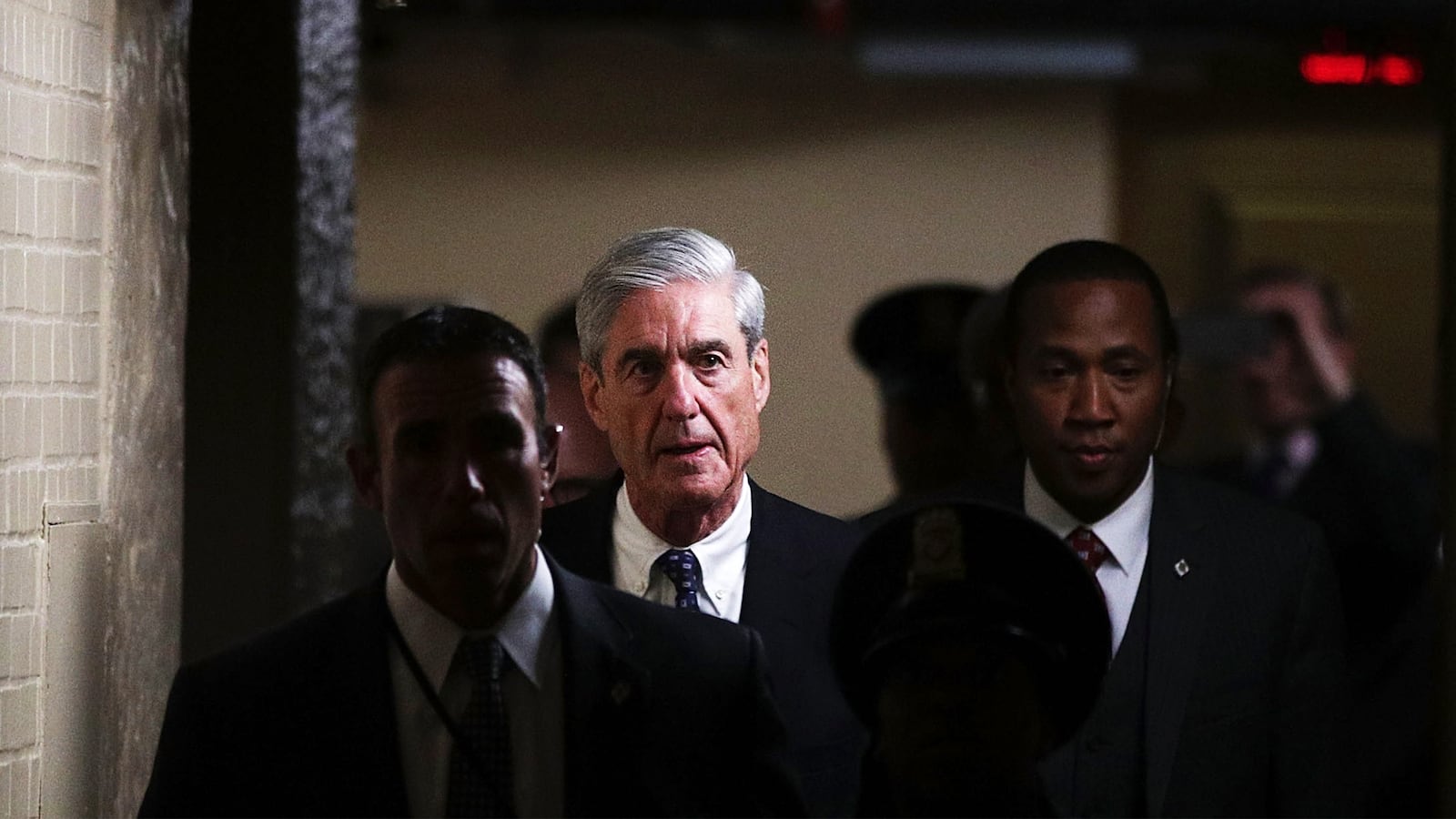Mark Warner didn’t use the word “impeachment” in his Senate floor speech on Wednesday. But the Senate intelligence committee’s top Democrat left the implication clear when he argued that a potential firing of special counsel Robert Mueller or the senior leaders of the Justice Department and the pardoning of witnesses needs to be a “red line” for the Senate.
“Congress must make clear to the president that firing the special counsel or interfering with his investigation by issuing pardons of essential witnesses is unacceptable and would have immediate and significant consequences,” Warner said Wednesday, warning that Mueller’s job is in real jeopardy.
Potential efforts by the White House to impede the investigation— which would represent “a gross abuse of power and a flagrant abuse of executive branch responsibilities and authorities,” in Warner’s phrase—need to be treated as “red lines, and [Congress] simply cannot allow them to be crossed.”
Nor did Warner exclusively aim his remarks at his Senate Republican colleagues—indeed, Warner wrapped himself in bipartisanship instead. But there as well, it’s clear they’re his real audience. The soon-to-be 49 Democrats in the chamber are already opposed to firing Mueller, who is investigating the Trump campaign’s ties to Russia. Republicans will face their strongest test of loyalty to Trump yet should Trump move to shut the probe down.
“Firing Mr. Mueller, or any other of the top brass involved in this investigation, would not only call into question this administration’s commitment to the truth, but also to our most basic concept: rule of law,” the understated Warner intoned. “It also has the potential to be a constitutional crisis.”
According to Warner, that’s a real possibility—even though Trump attorney Ty Cobb keeps insisting that Mueller is safe. “The president’s track record on this front is a source of concern. I’m certain that most of my colleagues believed he wouldn’t fire Jim Comey either,” Warner noted, referring to the former FBI director.
Cobb has only said that “there is no consideration at the White House of terminating the special counsel.” But Trump doesn’t need to fire Mueller to fire Mueller. He just needs to fire a different right-wing punching bag—Rod Rosenstein, the deputy attorney general and Mueller’s functional supervisor.
Republicans on the House Judiciary Committee took turns pummelling Rosenstein for hours last week over the Mueller inquiry—and far more. Following cues from an increasingly hysterical Fox News, Republicans on a committee overseeing both the Justice Department and the FBI described those institutions as a hothouse of Democratic Party loyalism.
They demanded not only the end of the Mueller probe, but new special prosecutors to investigate Mueller’s team and the FBI’s decision not to seek prosecution of Hillary Clinton for her private email server. That’s something, Rosenstein labored to point out, currently under investigation by the Justice Department’s inspector general.
It was a surprising reversal of fortunes for Rosenstein. A highly-regarded career prosecutor, Rosenstein lost the respect of many of his colleagues when he gave Trump a pretext for firing Comey – who at the time was running the Trump-Russia investigation. (Ironically, that pretext concerned Comey treating Clinton unfairly.) But loyalty and Trump are often a one-way street. The month after Trump fired Comey, he took a swipe at Rosenstein on Twitter, saying he was “investigated for firing the FBI Director by the man who told me to fire the FBI Director! Witch Hunt.”
Nevertheless, Rosenstein said he saw no good cause to fire Mueller and would not do so without such cause.
Trump amplified the right-wing critique on Friday morning before a police pep rally at the FBI’s National Academy training facility. “When you look at what’s going on with the FBI and the Justice Department, people are very, very angry,” Trump asserted, despite evidence to the contrary.
Hours later, a barely-concealed clash between the White House and the Mueller probe escalated, when a Trump campaign attorney insisted Mueller had illegally obtained emails from the Trump transition team through the General Services Administration. That prompted a rare public statement from the Mueller team, which has preferred not to do battle in the court of public opinion. “When we have obtained emails in the course of our ongoing criminal investigation, we have secured either the account owner’s consent or appropriate criminal process,” said spokesman Peter Carr.
“No one is above the law, not even the president,” said Warner, who cited the Republican Party affiliations of Comey, Mueller, Rosenstein and current FBI director Chris Wray as an indication of what he called the “baseless” charges of Democratic bias.
Any move by Trump to fire Rosenstein would cause a cascading effect at the Justice Department. In an ironic echo of the Comey firing, in which Rosenstein is complicit, the only reason to fire Rosenstein is to obstruct or shut down the Russia investigation.
The firing would also echo Richard Nixon’s 1973 “Saturday Night Massacre,” in which Nixon accepted the resignations of senior Justice Department officials until he found someone in the building—solicitor-general Robert Bork—willing to fire Watergate special prosecutor Archibald Cox.
Without Rosenstein, the investigation would immediately fall under the purview of associate attorney general Rachel Brand, another well-regarded figure in GOP legal circles, and the first question she will face is whether to shut Mueller down.
That is, if Brand doesn’t opt out. Brand and Mueller are former attorneys at the same law firm, WilmerHale, which might prompt her to recuse herself, kicking responsibility for the investigation down the halls at Main Justice to an assistant attorney general. Or she might keep hold of the probe for long enough for the next deputy attorney general to take office.
Alternatively, Trump could fire Jeff Sessions, his attorney general and a target of presidential blame for the Russia probe. Rosenstein only oversees Mueller because Sessions recused himself from Russia-related investigations that might place the former Trump campaign surrogate under scrutiny. (“Jeff Sessions takes the job, gets into the job, recuses himself, which frankly I think is very unfair to the president,” Trump groused to the New York Times.)
But any move to fire Rosenstein or Sessions will present a true loyalty test of the Senate Republican caucus to President Trump.
Any new attorney general or deputy attorney general will have to be confirmed by a Senate currently under tenuous Republican control.
After his upset win over Republican Roy Moore, Alabama Democrat Doug Jones will be sworn in by January 3rd, leaving Republicans with a 51-49 majority. John McCain, who is battling brain cancer, has been absent from votes in the Senate—including Wednesday’s pivotal tax bill—for weeks.
With Jones seated and McCain potentially absent, every Republican senator would have to vote to appoint a new deputy attorney general, knowing that the last person in the position was dismissed because he would not stop an investigation into the Trump campaign’s ties to the Russian government that has so far yielded two indictments and two guilty pleas.
That would force moderate Republicans, who have expressed full support for Mueller and his investigation, to effectively vote for his firing. It’s the second time around here: Senate Republicans in the summer warned Trump against firing him. “Any effort to go after Mueller could be the beginning of the end of the Trump presidency unless Mueller did something wrong,” South Carolina Republican Lindsey Graham said in July.
Graham reaffirmed his support for the special counsel this month – but that support has been less than ironclad.
“Mr. Mueller is doing his job and it's important that he can continue to do his job,” he said. But Graham also demurred from passing his own bill this fall protecting Mueller, insisting, “I don’t feel an urgent need to pass that law until you show me a reason Mr. Mueller’s in jeopardy.” Graham has drifted from Trump critic to Trump ally in recent months.
Nevada Republican Dean Heller, up for reelection in 2018 in a state Trump lost by two percentage points, will also be forced to vote on a Deputy AG whose job might entail closing down an investigation into Trump’s campaign.
Warner said he hoped his fears about Mueller are “unfounded,” but the “troubling signs” emanating from right-wing media, House Republicans and White House officials prompted his speech.
“It is critical that all of us, as elected officials and as citizens, speak up against these threats now, before it’s too late,” Warner said. It was the close of his 10-minute floor speech, but not of the now-daily speculation about whether Mueller will have a job tomorrow.







